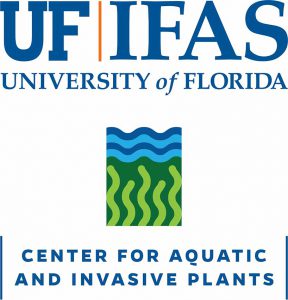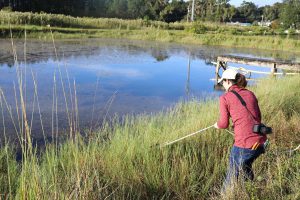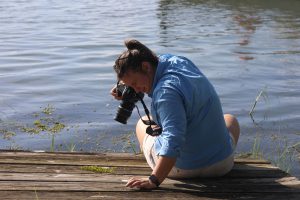By Dr. Jason Ferrell, UF/IFAS Center for Aquatic and Invasive Plants Director
 The UF/IFAS Center for Aquatic and Invasive Plants (CAIP) is not new. The Florida legislature formed CAIP in 1978. The Center has been nationally and internationally recognized as having the most current information on invasive plant monitoring and management since its inception. Not only has CAIP faculty published hundreds of scientific articles over the years, they have also maintained an outreach office. Over the years, this office has employed trained public-school teachers, citizen scientists and public relations staff. The Information Office has produced outreach material about invasive plants and provided thousands of free education posters to the public. All told, there is no entity like CAIP anywhere in the world.
The UF/IFAS Center for Aquatic and Invasive Plants (CAIP) is not new. The Florida legislature formed CAIP in 1978. The Center has been nationally and internationally recognized as having the most current information on invasive plant monitoring and management since its inception. Not only has CAIP faculty published hundreds of scientific articles over the years, they have also maintained an outreach office. Over the years, this office has employed trained public-school teachers, citizen scientists and public relations staff. The Information Office has produced outreach material about invasive plants and provided thousands of free education posters to the public. All told, there is no entity like CAIP anywhere in the world.
2019 has been a year to remember for CAIP. Due to a number of retirements, CAIP has had the opportunity to hire three new research and teaching faculty and two new information officers. This transition has been both tough and exciting. On one hand, we have lost tremendous experience and wisdom in those who retired. These individuals have operated at the top of their game for decades and were sought out for their expertise all over the world.

However, being able to hire new people has brought an infusion of new ideas, excitement, and opportunity CAIP has not experienced in quite some time. Bringing Dr. Candice Prince, an assistant professor in the UF/IFAS Agronomy Department, on board allows CAIP to offer classes that have not been taught in over 10 years. Dr. Benjamin Sperry, a research assistant professor, brings a wealth of experience in herbicide spray technology with the potential to transform the way we think about foliar application of herbicide. Dr. James Leary, an assistant professor specializing in aquatic plant management, is a “out-of-the-box” thinker. Dr. Leary is currently leading a series of experiments that will be the largest mechanical harvesting research effort ever attempted.

Meanwhile, Lara Colley and Shelby Oesterreicher are fundamentally rethinking how we do outreach. While the Information Office has developed materials used all over the world, under this new direction CAIP’s reach is sure to be greater. With a revamp to the UF/IFAS Invasive Plant Education Initiative and a rebrand of UF/IFAS CAIP, the Information Office is taking the Center’s outreach efforts to new levels.
Times of change can be tough and unsettling, but it can also be exhilarating. The Center’s leadership has put together a world-class team and the future is bright for CAIP.
CAIP faculty and staff wish to express our sincere gratitude to UF/IFAS for supporting CAIP with new positions and outreach efforts. UF/IFAS provides a support system for research centers like CAIP paralleled to none. CAIP faculty and staff are grateful to be a part of such a leader in science, research and extension.
Dr. Jason Ferrell, UF/IFAS CAIP Director, wrote this piece. Any questions should be directed to Shelby Oesterreicher at 352-273-3667 or soesterreicher@ufl.edu. For more information about the UF/IFAS Center for Aquatic and Invasive Plants, please visit https://plants.ifas.ufl.edu. Be sure to follow us on social @UFIFASCAIP.
UF/IFAS CAIP, Turning Science Into Solutions.
 0
0
